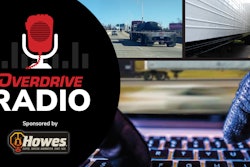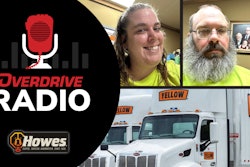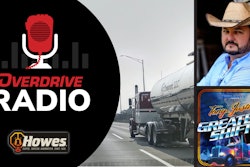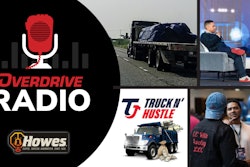Owner-operator Steven Massat is today headquartered in Addison, Illinois, and leased to nearby small fleet T Max Transportation with quite a special truck. Regular Overdrive readers may well have seen his when he was recognized as our August 2023 Trucker of the Month, putting him in the the running for Overdrive's 2023 Trucker of the Year award.
We’ve been counting down the months this year with profiles of and podcasts with each of the individual monthly semi-finalist owners -- or teams of owners, as it were. In this week's edition, Massat tells Overdrive News Editor Matt Cole all about the teamwork he and his wife make of the one-truck business -- she handles much of the back office work while he runs the roads and, on the weekend, uses a purpose-built shop to maintain the late 1980s-built B-model Cat engine in that special rig of his, a beautiful 1989 Marmon.
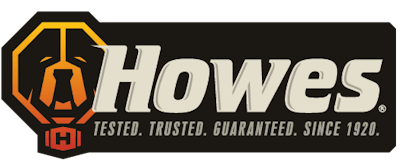 Overdrive Radio's sponsor is Howes, longtime provider of fuel treatments like its Howes Diesel Treat anti-gel and all-weather Diesel Defender, among other products.
Overdrive Radio's sponsor is Howes, longtime provider of fuel treatments like its Howes Diesel Treat anti-gel and all-weather Diesel Defender, among other products.

Today, what used to be a winter gig with T Max is now full-time, year-round.
Outbound from the Chicago area, he serves T Max's direct customers, often running spot market loads back, however slim pickings have been for those returns of late. His success sits on a foundation of conservative maintenance intervals, a laser focus on efficiency, and other smart business basics. Sit in on his history, in his own words, via the podcast:
Hear interviews with all of our 2023 Trucker of the Year contenders thus far via the playlist below.
Steve Massat: They came out and they gave me all this paperwork for disability and said, “fill this out” and I'm like, "No, get that away from me. I'm going home and going back to work."
Todd Dills: That was the voice of owner-operator Steven Massat today headquartered in Addison, Illinois and leased to nearby small fleet T Max Transportation with quite a special truck. Regular readers may well have read his story at overdriveonline.com a couple of weeks back now. Owner operator Steve Massat was our August Trucker of the Month, putting him in the running for our 2023 Trucker of the Year award that we've been counting down the months to this year with profiles of and podcasts with each of the individual owners, or teams of owners, as it were.
I'm Todd Dills, and in today's Overdrive Radio podcast for the week of September 10th, dropping to the feed just a little late this week on Saturday, September 9th, and posting to the world-famous overdriveonline.com Monday, September 11th, Massat describes the teamwork he and his wife make of the business. She handles much of the back office work while he runs roads, and on the weekend utilizes a purpose-built shop to maintain the late 1980s-built B-model Cat engine in that special rig, which you'll hear a little bit more about later.
Back office and other family support proves critical for the owner. As you heard up top when he was just 18-years-old, he was diagnosed with psoriatic arthritis. His life since then has been one of maintaining pain and complications day after day. He's 53 now though, and after decades of dump work with various Chicago construction outfits as an owner-operator, what used to be his wintertime home at T Max is now a year round affair.
Outbound from the region, he serves T Max direct customers, often running spot market loads back, however slim pickings have been for those returns of late.
Steve Massat: Unfortunately, right now with the economy, the loads are getting a little slimmer and a little cheaper, which you're almost to the point now it's better to come back empty than it's to take a load.
Todd Dills: After the break, we'll pick right up with Massat walking us through his early, early days trucking. Keep tuned for the big reveal too, a toy turned daily driver that is his old school classic workhorse.
Speaker 4: Love your diesel? We get it. Protect your investment and maximize performance with Howes Diesel Defender increased towing capacity, torque and power. With Howes you'll hear the smooth rumble of a clean and well-lubricated engine in no time. Oh yeah, and Howes Diesel Defender will increase your fuel economy by 5% or more. Guaranteed. Howes Diesel Defender for every diesel.
Todd Dills: Find more about Defender at Howes, H-O-W-E-S. Howesproducts.com. Here's Overdrive's August Trucker of the Month, owner-operator Steve Massat.
Steve Massat: Well, I started out as a little kid riding with dad. My grandpa had a construction company and my dad would drive, and also fix the equipment.
Todd Dills: He learned early how to grease the trucks, check the oil, and a few years later would receive a little money for more advanced tasks.
Steve Massat: I got $3 a tire for every flat I fixed. That was in the early eighties. So did that. My dad's great uncle had his own waste hauling business, hazards, waste and chemicals. And he was real good friends, him and my dad. He'd come down to the yard after work and they'd have a couple beers and talk and stuff.
I guess he admired that I was working, and the eighth grade graduation, he asked me, he says, "Come over here and work for me." I says, "Well, when do you want me to start?" He goes, "Monday." I said, "Okay." So the Monday after my eighth grade graduation, I started working with him. We worked almost seven days a week back then. So he had Macks worked on Macks and all that stuff.
Todd Dills: At just 16, Massat got his Class D chauffeur's license.
Steve Massat: So I started driving for him after school. I would drive downtown with a cab over an F Model, a 45-foot trailer, 16 years old. I'd drive downtown and pick up at the hospital downtown, all the [inaudible 00:04:31] waste. So I'd do that. I did that after school from like three to 10 o'clock every night. So all the way through high school, I did that. First summer out of high school, my dad says, "Well, if you're going to keep driving a truck, if you're not going to go to college, let's go buy your own truck and be an owner-operator." That's what he was.
So I'm like, "Okay." So I bought an old Mack. It was '88 when I bought my truck and I was 18-years-old. I bought a '78 Mack Value Liner, 300 with a two stick, six speed. We ended up rebuilding the cab, heating it, put a [inaudible 00:05:10] on it, and then started driving the next spring after I got out of high school. So I was owner-operator doing that, hauling gravel and dirt and stuff around Chicago. I turned 21.
Todd Dills: The company owner that Massat was working for mostly at the time, offered him a company driver job and he took it, parking but crucially not selling that 1978 Mack. Stick a pen in that.
Steve Massat: Took that job and it lasted two years. The owner was 48-years old when he died of cancer. Yeah, a year after I went there to work for him, he ended up getting cancer. So he ended up closing the doors. So I still had my old truck. So I went back to my old truck.
Todd Dills: The audio is not the best there, but what Massat was saying was he turned right back to the old 1978 Mack, which would then provide the owner-operator a lesson he didn't soon forget.
Steve Massat: It was in pretty bad shape, and when you're 18-years-old, you don't care about a loose bolt. There's a bunch more there, don't worry about it. So it came back and it bit me hard, ended up having a crack frame on it. So I took two weeks off and ended up stripping the whole back of the frame and the cab back. All new cross members, slid two frame rails in, double framed the back half. Rolled it all out by hand, put it all back together. It was great. I drove it for about six months after that. We had a big job in the city, and I did really, really well. Made a good chunk of money and everything was paid off. I had money in the bank and I told my dad, said, "Dad, I'm going to buy a new truck." He says, "Go ahead, you earned it."
I always liked Marmon, had a thing for them back then, even as a kid. So I went and looked at a new Marmon, talked to the dealer there in Chicago, Marmon. Got one set up, went to the bank. A friend of mine was working for a sewer company. He had a real nice Mack. I always told him, I said, "If that truck ever came up for sale, I'd buy it." The day the bank gave me the approval, he called me to tell me the truck and trailer were for sale. So I sat back and I talked to my dad. We agreed that it'd be a better deal if I bought that truck instead of a brand new truck, because then I would've a good trailer too instead of the old raggedy trailer I had. So I bought that truck, and a '91 Mongoose, and this was in fall of '93.
Matt Cole: What year model did you say the truck was?
Steve Massat: '89.
Matt Cole: '89, okay.
Steve Massat: It was four-year-old truck and a two-year-old trailer had a hundred thousand miles on it. It was well-maintained, real good shape. So I bought in October, I drove it. And I come in one morning and it's gone. So somebody stole the tractor. They left me the trailer at least, but they stole the tractor. Never did find it.
So I went back to the bank. I says, "Would you give me a loan for a new truck, again now?" So they says, "Yeah, we'll do it." So I went back to Marmon and the truck that I wanted was gone. They didn't have anything that would work for me, so I ended up buying International. Told Dad, "I'm going to pay this off, spec out a brand new Marmon." And about two months before I was ready to do that, I opened up the pages of Overdrive Magazine and Marvin Motor Company was closing their doors. So I ended up sticking through another year and a half with my truck, got it all paid off, and good chunk of money in the bank, and then I specked out a new International.
So I went 15 years, 16 years like that and probably told my wife I needed a toy. I said, "All my friends have motorcycles and snowmobiles and boats and all this fun stuff and all I do is go to work." She says, "Well, what do you want?" I says, "Well," and I didn't answer at first. And she goes, "You want to get motorcycles?" I'm like, "No, no. I don't want motorcycles." "Well, what do you want?" And I said, "Well, I want to buy another truck." She goes, "Oh, you're a, well a-(blank)." I can't say the rest.
I explained it to her. I says, "I don't care if I ever drive it again.: I said, "I just want it, put it in my garage, and I'll sit on. I'll just tinker with it, take it to truck shows and stuff." So she let me buy it.
Todd Dills: And just what was it in this case? That Marmon he'd always wanted, a 1989 model in this case, purchased in 2014.
Steve Massat: Let me back up a little bit. That new International that I specked out, it was going on five-years-old. It was 2004. So I went to the Louisville Truck Show. On a couple different radio shows, I listened to at the time, I kept hearing about this EGR and emissions and all this stuff on these new motors. So I wanted to see what it was about. I didn't know anything about it. So I went to the Caterpillar display and I found an engineer there and I says, "Hey, can you explain it to me?" I said, "I just want to know what it's about before I go getting involved in buying one." He says, "Sure." He comes over, he shows me a new EGR motor and he says, "Well, it's just a turbo piper on the other side and back into the motor. Is there any questions?" I says, "Yeah, I got two."
I says, "What happens if I blow the first turbine? What happens to the second turbine?" He says, "Well, you usually blow that one too." I said, "Okay, so you just doubled my cost of a repair. That's not cool." I says, "So where's the filter?" And he says, "Filter for what?" I says, "Filter for all the dirty air that's coming into a clean motor." He goes, "Yeah, there is none. There is none." I said, "Okay. Really?" He goes, "Yep." Turned around and looked at my wife. I said, "Don't worry, honey, I'm done buying new trucks. I built a big garage."
Matt Cole: There you go.
Steve Massat: So now I got my garage. I got it set up where I can do a lot of things myself. I take care of my own truck. I grease it. I maintain, even now, 10,000 miles oil change. Have never had an oil related problem in 35 years of driving. And it gets greased other week. Every two weeks, it gets greased, every part. When I sold my International in 2016, it had a million plus miles on it, still had all six original slack adjusters on it, and they still worked. There's a testament to maintaining your vehicle.
Todd Dills: Owner-operator Massat puts less emphasis on what he makes with his truck, rather what he doesn't spend on it, he said. That mindset serves him well now that he's actually in business running the old 1989 Marmon full-time. That's right. It became a little more than a toy eventually. He put it into service now some years back.
Steve Massat: But having an older truck and having my garage, I try to make it where I can work the week without a problem, and then Saturdays, it's time to get dirty and turn around and do what you got to do. Make sure everything's up to snuff so come Monday you're going back to work. You only have five days to make your money. Saturday and Sunday you got to take a day off for the Lord. Take your Saturday to get what you need to get done. It's worked good for me over the years.
Todd Dills: Steve Massat, headquartered around Chicago, spent decades hauling in the construction industry in and around the city before migrating to where he is today, over the road.
Steve Massat: With construction in Chicago, you work about nine months, three months where you're kind of laying around. So I always found a company to work for in the winter, keep me busy, or as busy as I want to be. And I ended up with this company. They're the town over, so they're nice and close, and they've worked out wonderful for me. I would recommend them to anybody in this area that wants to make money.
Matt Cole: And that's T Max?
Steve Massat: Yes, sir. A lot of their guys, they end up buying the truck for them and do a purchase deal with them. There's a couple of guys like me that own their own truck and stuff. And almost all the loads are already preloaded on their trailers, so I don't even need to have a trailer. You go to their shipper. They've got three or four different shippers and they're close. I'm right in the middle of all of them, so it makes that real nice for me. So you go pick up your load. You got some that's like LTL freight. You drive to St. Louis and have four or five stops, pick up a back haul and head home. Other stuff, it's a one load. Unload, pick up a load, come back. All of it's all no-touch freight. They settle every week.
It was kind of funny when I first started working for them, it was like a month in and the dispatcher calls me, she says, "Are you independent wealthy?" I says, "Well, no. Why?" She says, "We just can't understand. You got four checks in here and you haven't picked any of them up." And I was so used to with the [inaudible 00:14:15] you wait 30 days for your money. So I didn't even think about looking for a check. She says, "You've got four checks in the box and we wonder why you're not picking them up." "Well, I didn't know they were there. Believe me, I'll pick them up. So that was kind of nice getting used to that, steady every week getting a paycheck. Give back your paperwork Monday or even Tuesday morning and by Friday you've got a paycheck. Their rates are really good. They're a small company, got about 11 trucks total. They take great care of you. I wouldn't dream of going anywhere else. I've got my own company, so they pay my company and then I pay myself a salary out of that.
Matt Cole: Your wife's involved in the business too. Is she on the driving side?
Steve Massat: She does all the paperwork. Without a good woman by your side, it's a hard business to deal with. It really is. And if you're going to try to work hard, make a lot of money or make any money and not have someone to help you with the books or things, it's tough to do it all on your own. It really is. She's my godsend and savior.
Matt Cole: So she manages the paperwork side of stuff.
Steve Massat: Right, right. Our checks are automatically deposited. So Friday, she'll write the checks from the company back for our salaries and pay the bills and do all that. She does all the IFTA for me. License plates, all that stuff we do ourselves. So she takes care of all that, make sure it's all done. The insurance, workman's comp, all that stuff is taken care of with her.
Any time I need a part or something like that and I'm going to be coming home late or something, she'll go to Peterbilt or wherever and pick up a part for me and have it for me waiting here. So saves me some time. I'm kind regional. Monday I'm going to Carrollton, Kentucky, which is a five-hour drive. We do a lot of St. Louis, Cincinnati a little bit, upper Michigan, a little bit of everything. There's some longer stuff. I go to Kansas City, get some longer stuff. I try not to do it. I don't like the longer stuff. I'd rather get somewhere where I can get home the same day, go out, five hours out, five hours back. That works good for me.
Todd Dills: Overdrive news editor Matt Cole in his talk with Massat then asked him to elaborate on the story of just how he came to own that classic 1989 Marmon. Massat was happy to oblige.
Steve Massat: Well, I bought it in 2014. I was sitting there. I was working for the construction company, didn't have to use my own truck. So I had my truck plated and insured. When they laid me off, I'd go to work for the winter. The then come spring when they call me back, I'd park it and go. So I finally got to the point where I says, you know what? Construction anymore, so let's sell the trailer. So I talked the wife into letting me sell the trailer and take it to buy the Marmon, and of course she got half the money. She got half the money for her and the house, and then I got the other half to buy my Marmon. So that's how that worked out. We had to grease the skids a little bit.
So I did that. I bought it, drove it back from Alabama, never really intending to run it. I thought I would buy it and just take it to the antique shows and put a little time fiddling with it and fixing things up and making it nice. So when I brought it, I drove it home and I was like, "This ain't so bad after all." I says, "All right, this is something doable." So I got back, I started working. I spent about two years fixing most of the major stuff, changing belts, changing all the hair lines, all that stuff. Everything I could, anything rubber that I knew would be rotted or dry rotted. I immediately put automatic slacks on the whole truck. I put new brakes, new shoes. I had to rebuilt the roof suspension. Put all the hangers on the back. Started running it in 2016. Sold my International, started running that one and kind of never looked back. Yeah, I painted it in my garage. It's not the greatest paint job. It's got that 50 yard, it looks good from 50 yards away.
Matt Cole: There you go. All right, and how many miles on it did it have when you bought it?
Steve Massat: I know it's got over 3 million on it now.
So I put about 600,000 on the last four years. So I want to say it was right at 2 million when I bought it. The odometer didn't work for a little while there too, so that was something I had to take care of and fix. But it's not sitting around too much. It's going. On maintenance, my yearly maintenance, except for any major problem I might have, my yearly maintenance is between 12 and 20 grand a year on repairs and stuff. And of course that's not counting my time. That's parts prices and stuff like that. But yeah, it's very close to what I spent on when I had my dump and my other truck too. But then I had a trailer to deal with too, not just a tractor.
Matt Cole: Right. Extra brakes and airlines and all that stuff. Yeah.
Steve Massat: Tires, eight more tires. It's a little more expensive to run this truck. I know that. But I don't have any emissions problems. I see that constantly with the newer trucks, and our other 10 guys that got newer trucks. I see it constantly. They're in the shop for a sensor or for this and they shut down. It never made sense to me. It never did from the time I looked at that EGR motor, and saw them dumping exhaust into the clean motor. This doesn't make any sense. This is ridiculous. How's that motor going to last when you're pouring garbage in it?
And it seems to be the way it is, because they're not lasting. They're not getting the mileage out of they used or the work without having to repair them. And now after Covid, everything's just so crazy. You take it off to dealer's, it's like, "Well, we'll get to it in a month." How do you pay that payment for the next month when it's sitting in the garage doing nothing. You're not making any money. I just never understood the reality of how that's worth it.
It's nice to have a new truck. I've had two brand new trucks in my life and, yeah, it's nice to have a brand new truck. But when you got that much stuff stacked, I'll take my old truck any day and I know what I got. If I blow a hose, I walk to the hardware store and buy a hose and put it on. Not, well, it's a special-made hose and this special O-ring and this special fitting. It just doesn't make any sense. You buy a hundred thousand truck and they put a plastic elbow on the back of the block. When it breaks and you lose all your antifreeze, you're stuck on the side of the road. Now what do you do?
Whereas if that were me, it'd be a metal elbow and a hose. The hose breaks, you go buy a new hose, you throw it on. You walk to Menards, wherever, to buy a piece of hose. You put it on, look under your sleeper and your pile of hoses you got and you keep with you and there you go. You're back in business. That's one thing I do do. I try to carry all my belts, all my hoses, intake hoses, the turbo hoses, all that stuff. I got extra ones I keep in a box underneath the sleeper. And hopefully I never use it, but where something breaks and you're like, "Okay, let me go dig for it. I know it's there somewhere." Go for it. You pull it out, you put it back together and you're back on the road. You're not calling for a service call at $500 you're throwing away to ask someone bring you a $10 part.
Todd Dills: The rigs powered by a four and a quarter B model Cat and big fuel tanks that come in handy for sizable purchases in lower price locales when variability at the pump is high. Maintenance wise, as noted previously, oil's changed every 10,000 miles, grease it every two weeks.
Steve Massat: You run it and you grease it and you really don't have too many problems. I try to change the antifreeze. You get the lifetime antifreeze, but I still try to change it, whether it's because I blew a hose or whether it's because it's changing the water pump or whatever. If I drain it out, I won't put it back in unless it's less than two years old. I'll put new stuff in. I change batteries every three years whether they need it or not. I only run three batteries, but I don't trust after that, and I don't idle. I try not to idle at all. Even in the winter, I'll shut the truck off. For a long time I didn't even have, I got a little [inaudible 00:23:20] now, but for a long time I didn't even have that and I just had a couple snowmobile blankets. Yeah, you wake up blue and could hardly walk.
Matt Cole: Yeah, those Midwest winters can get pretty rough.
Steve Massat: Yeah, if it's above five degrees, I'll shut the truck off. Once it gets down below five, then I'll probably leave it run. I never leave it just idle. I'll kick up the idle a little bit to get the oil pressure up. Try to save the motor a little bit of wear. I don't know, people say I'm crazy for doing it, but I'm not going to let it just sit there in idle. I have air conditioning, but I never use it.
Matt Cole: Yeah, well, crazy or not, you’re still on the original engine in that truck, so I think it’s paying off somehow.
Todd Dills:
Massat agrees. The unit's been through a rebuild in the past for sure, but the Cat remains original. Here's a big thanks to him, our August Trucker over the Month, for walking us through the basics of his history. In Matt Cole's feature about him, published about a week and a half back at overdriveonline.com, he does share more about how he beat the odds after a diagnosis of psoriatic arthritis when he was a very young man that essentially qualified him for a lifetime disability. However, he's continued to work and he's lived with the sometimes debilitating condition ever since. And on top of everything involved in managing the day-to-day his trucking business, he manages that, too.
I'll post the link to Cole's story in the show notes wherever you're listening. Overdrive Radio is on Apple and Google Podcasts, SoundCloud and Spotify, overcast.fm and many, many others including the world-famous overdriveonline.com/overdrive-radio. Where you'll find the full collection. And here's a big thanks for listening. Any feedbacks or tips for me directly use our podcast message line at 615-852-8530. Always love to hear from you.

